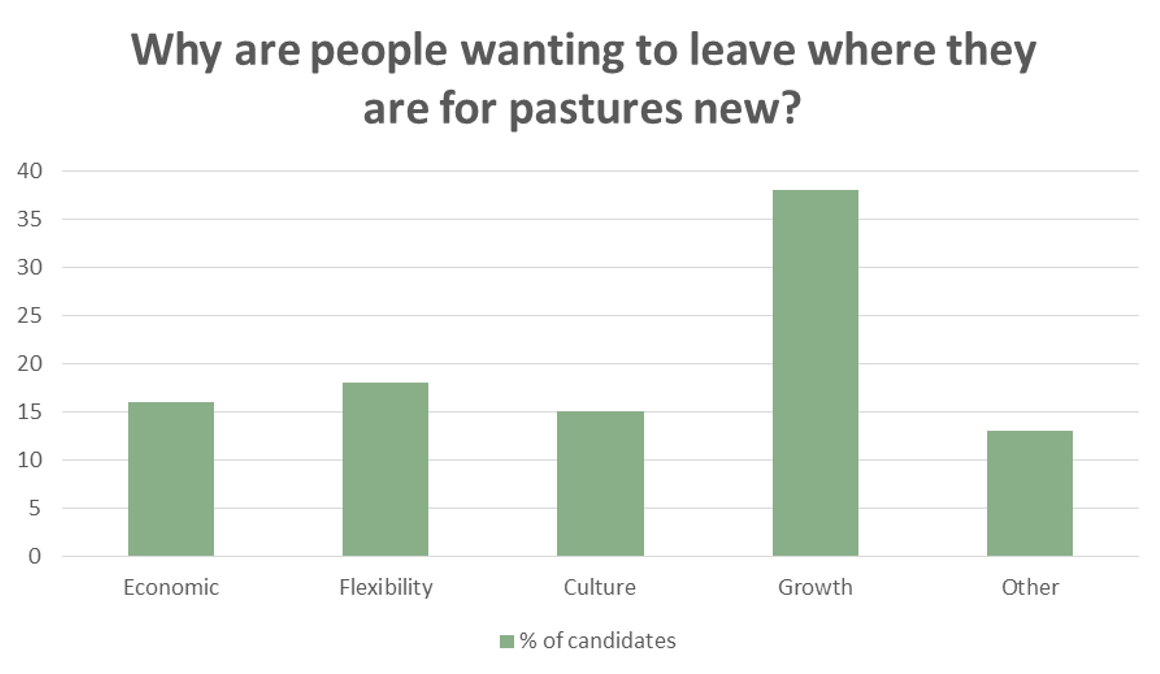
This is a guest post by Raisa Sadiq, founder at Intro.
It’s a testing time for all managers. As well as their day jobs, there are multiple challenges around Recruitment & Retention. These areas have always been demanding – but throw in ‘The Great Resignation‘, and a global labour shortage – both have become even more difficult to accomplish.
In Late 2021, Gartner published that organisations will be faced with a staff turnover rate that is 50%-75% higher than previously known, with recruitment taking 18% longer since before the pandemic.
Dealing first-hand with candidates and organisations, I have the privilege of gaining a 360 insight into the Tech labour market, to understand the reasons behind these dramatic changes.
Let’s start with the basics – why are people wanting to leave for pastures new?
Economic reasons
The most obvious, that has always existed, and will likely always last is economic (seeking improved salary/financial benefits). We are navigating a global cost of living crisis, some countries more affected than others and it has always been instinctive to seek out the best conditions for the work we do.
The reality, however, is that generally, organisations have the data and resources to ensure they are offering compensation close to/in line with the wider market. Often, new positions offer salaries and financial benefits that are not too different to what people already have, or what their competitors are offering. In a market of pay freezes and bonus reductions, surprisingly only 16% of candidates I have spoken to since the beginning of 2022 are looking for a new job primarily for economic reasons. 69% of which reside outside of mainland Europe. If this is a shock to you, you are not alone. 75% of employers I deal with assume that people leave primarily for this reason.
Culture fit
Sometimes, the pairing is simply a poor match. I may be stating the obvious here, but it is often forgotten that employment is a two-way relationship. Organisations spend so much time looking for the right people to hire, but ultimately will only be appealing to a certain percentage – it is an aspect that is relative to individual preference. The challenge has amplified now that 85% of workers in Tech are working fully remotely or following a hybrid model. Companies are forced to be more innovative and creative about maintaining an appealing atmosphere. Cliché, but a ping-pong table or ‘beer o’clock’ on a Friday is no longer enough, nor relevant.
The events over the last few years have made us all appreciate stability and longevity in one way or another. So naturally, more candidates are beginning to ask themselves “is this environment right for me long-term?” and as a result are scrutinising company culture, more than ever.
Flexibility and or work-life balance
Again, this is something that will mean different things to different people. For some, work is one of few commitments. For others, life outside of work is equally as demanding as their day jobs. Either way, remote & hybrid working models, flexible hours, even 4 day working weeks have become industry standard. 18% of candidates I have spoken to this year have been seeking a new position primarily for more flexibility, which means according to my findings, in today’s Tech market, time is more valuable than money.
Growth and impact
An astounding 38% of candidates actively seeking a move are doing so primarily for opportunities to grow and make an impact. 80% of them are of the belief that there is not any scope to do so in their current organisations. This taxing market is dictating that promotions are taking longer to achieve. But promotions are not solely what candidates are in quest of. The prospect of working on a different project, within a fresh team, or exposure to a modern technology is enough to satisfy curiosity, contribute towards growth and ensure prolonged engagement. Acknowledgement is also very much appreciated, nothing is more satisfying than seeing suggestions, proposals and efforts come to life. Employees strive to feel useful and impactful, as well as valued.

This data has been collated since 1st January 2022 by intro Consulting Ltd.
N.B. this data is only relevant for people voluntarily seeking a career move.
Of course, there are various additional factors or sudden changes of circumstance (e.g. the need to relocate abroad), personal to individuals that are not within any of the categories I have touched on, also contributing to the increased turnover in the current Tech market.
What can employers do to minimise movement and increase retention?
Reasonable hiring processes and thorough onboarding
I truly believe that employee retention begins with talent attraction. For many prospects, the first time they will have had any engagement with your brand/organisation is during the recruitment process. In this candidate driven market the importance of a speedy, seamless, informative recruitment process is at an all-time high. While the pressure is on for candidates to perform, unnecessarily cumbersome hiring processes, poor communication and lack of feedback are all red flags. First impressions count, and for applicants, this demonstrates what it could be like working for that organisation. The onboarding process is also crucial for the same. At a time when ‘new job nerves’ are present and feelings heightened, if there is a sense of disorganisation or lack of consideration, motivated and energised new joiners can be left questioning their decision. We all want to start how we mean to go on…
Partnering with the right recruitment agency who can act as a sincere ambassador of your brand can be imperative for these reasons.
Regular reviews to ensure alignment with market rates
(To let you in on a little secret) organisations are not the only ones having conversations with recruiters or collecting data for benchmarking purposes – employees are doing the same. Keeping one ear out in the market allows them to ensure they are in the best position possible. If they learn they are not, they are driven to have uncomfortable internal discussions, or ultimately look elsewhere. Regular benchmarking allows employers to be a step ahead, avoiding these uncomfortable situations, increasing retention.
Ultimately, when economies bounce back, organisations intentionally hiring cheap to save money risk losing talent they have invested time in attracting and onboarding. Candidates who accept lower offers today, taking into consideration the state of the market, will soon realise their true value resulting additional churn that could potentially be avoidable by regular market analysis.
Don’t just offer flexibility, be adaptable
Not all Software Engineers want to work remotely and not all Product Managers can work onsite; there is no universal meaning of flexibility. Whilst the pandemic has shown most of us can do our jobs efficiently without commuting to an office location, for some operating without physically being surrounded by a team just does not work. They need the comradery, buzz and inspiration that ‘Zoom’, or ‘Teams’ does not offer.
So, flexibility does not just mean less time in the office, or at work. It means organisations being aware of the requirement to adapt themselves to suit the needs of its existing and prospective workforce, for a productive two-way relationship.
Pave the way by providing a clear career path
The data collated dictates this could be one of the most crucial ways to minimise turnover and improve engagement. Given that 80% of those seeking change for growth and impact do not feel they are able to achieve it in their current organisations raises questions around how accessible information about development or progression is to these employees in the first place.
Providing a clear path from day one, is a simple, yet effective way of ensuring long-term commitment from employees as well as demonstrating the same back to them. Better yet, be more vocal to prospects about fellow team members whose careers can demonstrate success in the business and potential achievements.
Where does Ebury’s Engineering team fit in?
I have partnered with Ebury as an external recruiter for 7 years and have successfully intro’d multiple candidates across Engineering (including Victor Tuson who is now their CTO). Over this period, I have seen many approaches and various evolutions in their attempts to attract and retain talent, and in my opinion, here is where they excel against their competitors…
They invest in their workforce
Despite having a fully remote, globally distributed Engineering team of over 200, everyone is hired knowing exactly the level they are at, and what they need to do to progress if they so wish. Through technical exercises and various discussions during their recruitment process, Ebury can quickly decipher where applicants sit on their career development path. This applies for both Technical and non-Technical (and/or Leadership) positions.
Quarterly structure reviews
Every 3 months, Ebury spends time reviewing their Engineering teams and overall structure. Not only does this allow them to identify which teams/squads could benefit from additional resource, it also gives them visibility of the full picture. They can understand which team members could benefit from working on a different project or if someone requires more support with a specific tool/technology. An excellent practise for several reasons, and a pivotal part of their success.
They listen to the market
Ebury has consistently been an industry leader. Prior to the pandemic, to attract the best talent they introduced remote working for Engineers, in various locations – a perk that very few FinTech organisations with HQs in London were offering at the time. Now, the whole of their Engineering team is fully remote, adhering to some core working hours, allowing everyone, despite their geographic location, to have adequate crossover. They also offer support with relocation to their main hub in Spain for given circumstances.
The proof is in the pudding
Ebury’s leadership team is bursting with stories of successful internal progression, across all areas of the business. Having been on this journey with them for a while, I have witnessed some who have started at Ebury as Interns develop and progress into Directors. I have also seen people move on to join some of the most highly regarded organisations around the globe after gaining exposure to cutting-edge technologies and industry-leading best practices at Ebury.
A company’s greatest asset is its people
In summary, there is no magic to either Recruitment or Retention. Having a good grasp of the why behind any movement is one of few things we can all, as employers, make more effort to master to in turn support with the what or the how. Without understanding what motivates our workforces, how can we expect to align our vision and objectives?
Get in touch!
If you would like some more context around the points I have touched on, you can get in touch with me at [email protected]
Raisa Sadiq, founder at Intro.
